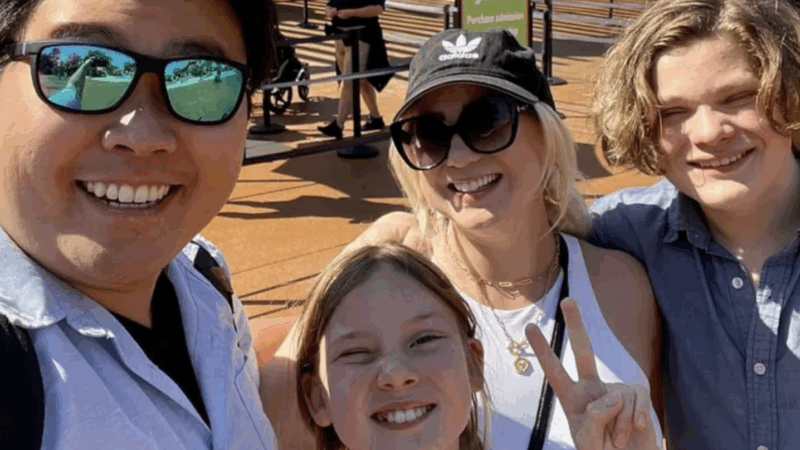Musicians show support for longtime Utah violinist detained by ICE
Members of the music community are rallying in support of Donggin Shin — who goes by John — following the Utah-based professional violinist’s arrest and detention by U.S. Immigration and Customs Enforcement (ICE) in Colorado last week.
Department of Homeland Security officials, citing the reason for his arrest, said the South Korean-born Shin overstayed his visa and was later convicted of a DUI in 2019.
According to Shin’s attorney, Adam Crayk, the musician — who has played with the Utah Symphony and Ballet West, among other groups — was abruptly arrested on Aug. 18 at a hotel parking lot while he was traveling in Colorado. According to an ICE database, he is being held at the Denver Contract Detention Facility in Aurora, Colo.
“John Shin is a longtime member of the local Salt Lake City music community,” said Utah Symphony spokesperson Meredith Kimball Laing in an email. “His many contributions as a violinist have included some performances with our orchestra through the years, and our hearts go out to him and his family.”
Musicians have been staging ongoing performances in protest at the Utah State Capitol and sharing their anger and concern on social media. “I am calling upon all string players in Salt Lake City to unite in support of our fellow musician John Shin, who has been detained by ICE,” wrote violist Eugene Dyson on Facebook. “The time has come for us to rally together and fight for our own with unwavering solidarity.”
In a Facebook post on Aug. 20, Shin’s wife, DaNae Shin, shared the details of the phone call she said she received from Shin on the day of his arrest. ” ‘Honey, I don’t have much time. I’ve been arrested by ICE and they are sending me to a detainment center. I love you and the kids, I will be okay, please call our attorney,’ ” DaNae wrote. She added, “John is not a criminal, he is an amazing husband, father, and person, and I will do whatever it takes to bring him back home.” DaNae Shin set up a GoFundMe campaign to help cover her husband’s legal fees. At the time of writing, it had received more than $72,000 in donations.
Crayk said Shin, 37, came to the U.S. from South Korea with his father when he was a child.
In a statement to NPR, the Department of Homeland Security (DHS) confirmed the arrest. Describing Shin as “a criminal illegal alien from South Korea,” the DHS statement gave Shin’s criminal history — specifically a 2019 DUI conviction — as the reason.
“Shin entered the U.S. on a tourist visa on September 3, 1998. This visa required him to depart the U.S. by March 3, 1999. Over 25 years later, he was still illegally in the U.S.,” read the DHS statement. “President Trump and Secretary Noem are committed to restoring integrity to the visa program and ensuring it is not abused to allow aliens a permanent one-way ticket to remain in the U.S. Our message is clear: criminal illegal aliens are not welcome in the United States.”
Court records obtained by NPR show Shin was indeed charged in Oct. 2019 with a misdemeanor DUI at Tooele County Justice Court, to which he pled guilty. (There are four additional and less serious traffic violations on his record.)
Shin’s lawyer said that his client’s father eventually obtained a student visa. This visa also at the time covered Shin as a dependent. Shin later became a recipient of the Deferred Action for Childhood Arrivals (DACA) program — an Obama-era immigration policy that provides protection from deportation for eligible undocumented immigrants who were brought to the U.S. as children and have been in the country for many years.
However, a DUI conviction — regarded as a “significant misdemeanor,” according to the Immigrant Legal Resource Center, a nonprofit organization that advocates for immigrants’ rights – is enough to cause a person’s DACA status to be revoked.
As ILRC puts it on their website, “Persons are barred from receiving or renewing DACA if they have been convicted of a felony, a significant misdemeanor, three or more misdemeanors, or otherwise pose a threat to national security or public safety.”
Despite last month’s drop in immigration-related arrests, this year has overall seen a massive surge in such detainments in the U.S. as President Trump seeks to enact his promised “mass deportation” agenda. In several states, the rate of ICE arrests has more than doubled since last year.
Shin, whose case is scheduled for a hearing on Sept. 2, isn’t the only artist apprehended by ICE this year. Brazilian visual artist Guilherme Lemes Cardoso E Silva was arrested close to his home near Seattle, Wash., last month. DHS said he was in the country illegally after his nonimmigrant visa expired in 2017. And Jane Eugene, a British vocalist best known as a founding member of the 1980s R&B band Loose Ends was recently detained by ICE for overstaying her visa. “Let’s free Jane!” states the GoFundMe page set up to cover Eugene’s legal fees. “She loves America, has made her home here, and wants to fight using every legal remedy available.”
From chess to a medical mystery: Great global reads from 2025 you may have missed
We published hundreds of stories on global health and development each year. Some are ... alas ... a bit underappreciated by readers. We've asked our staff for their favorite overlooked posts of 2025.
The U.S. offers Ukraine a 15-year security guarantee for now, Zelenskyy says
Ukrainian President Volodymyr Zelenskyy said Monday the United States is offering his country security guarantees for a period of 15 years as part of a proposed peace plan.
Genre fiction and female authors top U.S. libraries’ most-borrowed lists in 2025
All of the top 10 books borrowed through the public library app Libby were written by women. And Kristin Hannah's The Women was the top checkout in many library systems around the country.
Teens are having disturbing interactions with chatbots. Here’s how to lower the risks
Teen use of AI chat bots is growing, and psychologists worry it's affecting their social development and mental health. Here's what parents should know to help kids use the technology safely.
Why do so many people ring in the new year on Jan. 1?
Much of the world follows the Gregorian calendar, named after Pope Gregory XIII, who put the finishing touches on a Roman system that integrated ideas from other cultures.
Electric vehicles had a bumpy road in 2025 — and one pleasant surprise
A suite of pro-EV federal policies have been reversed. Well-known vehicles have been discontinued. Sales plummeted. But interest is holding steady.







